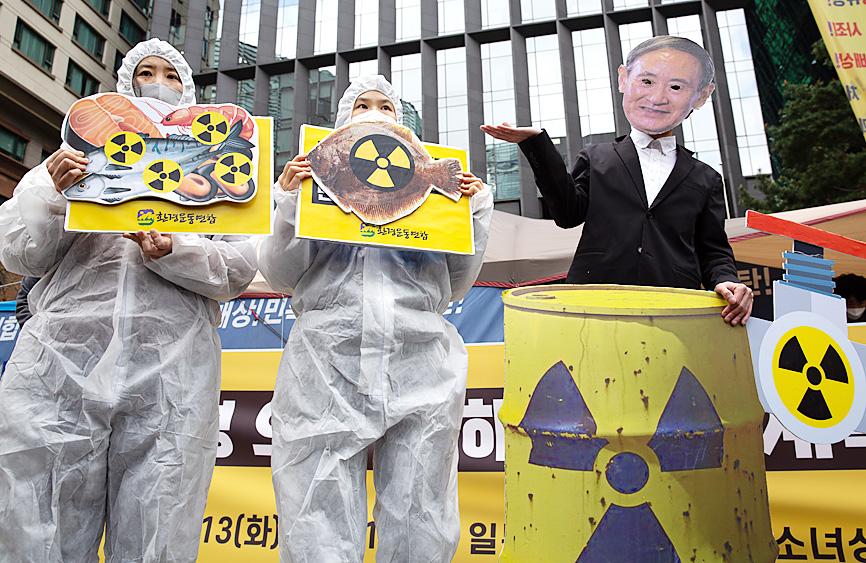Japan plans to release more than 1 million tonnes of treated water from the stricken Fukushima Dai-ichi nuclear power plant into the ocean, Tokyo said yesterday, triggering a furious regional reaction and fierce opposition from local fishing communities.
The process is not likely to begin for several years and could take decades to complete, but China quickly slammed the decision as “extremely irresponsible,” while South Korea summoned the Japanese ambassador.
The Japanese government argues that the release is safe because the water is processed to remove almost all radioactive elements.

Photo: EPA-EFE
The International Atomic Energy Agency has endorsed the release, which it says is similar to the disposal of wastewater at nuclear plants elsewhere.
Japanese Prime Minister Yoshihide Suga told a ministerial meeting that disposing of the water was an “inevitable task” in the decades-long process of decommissioning the nuclear power plant.
Suga said the release would happen only “after ensuring the safety levels of the water” and alongside measures to “prevent reputational damage.”
About 1.25 million tonnes of water have accumulated in tanks at the plant, which was crippled after going into meltdown following an earthquake and tsunami in 2011.
An extensive pumping and filtration system extracts tonnes of newly contaminated water each day and filters out most radioactive elements, but local fishing communities fear releasing the water would undermine years of work to restore confidence in their seafood.
“They told us that they wouldn’t release the water into the sea without the support of fishers,” Kanji Tachiya, who heads a local fisheries cooperative in Fukushima, told NHK ahead of the announcement. “We can’t back this move to break that promise and release the water into the sea unilaterally.”
The Chinese Ministry of Foreign Affairs slammed the decision, saying it had been taken “without regard for domestic and foreign doubts and opposition.”
“This approach is extremely irresponsible, and will seriously damage international public health and safety,” it said.
The South Korean Ministry of Foreign Affairs called it “a risk to the maritime environment” and later announced it had summoned the Japanese ambassador.

Right-wing political scientist Laura Fernandez on Sunday won Costa Rica’s presidential election by a landslide, after promising to crack down on rising violence linked to the cocaine trade. Fernandez’s nearest rival, economist Alvaro Ramos, conceded defeat as results showed the ruling party far exceeding the threshold of 40 percent needed to avoid a runoff. With 94 percent of polling stations counted, the political heir of outgoing Costa Rican President Rodrigo Chaves had captured 48.3 percent of the vote compared with Ramos’ 33.4 percent, the Supreme Electoral Tribunal said. As soon as the first results were announced, members of Fernandez’s Sovereign People’s Party

MORE RESPONSIBILITY: Draftees would be expected to fight alongside professional soldiers, likely requiring the transformation of some training brigades into combat units The armed forces are to start incorporating new conscripts into combined arms brigades this year to enhance combat readiness, the Executive Yuan’s latest policy report said. The new policy would affect Taiwanese men entering the military for their compulsory service, which was extended to one year under reforms by then-president Tsai Ing-wen (蔡英文) in 2022. The conscripts would be trained to operate machine guns, uncrewed aerial vehicles, anti-tank guided missile launchers and Stinger air defense systems, the report said, adding that the basic training would be lengthened to eight weeks. After basic training, conscripts would be sorted into infantry battalions that would take

GROWING AMBITIONS: The scale and tempo of the operations show that the Strait has become the core theater for China to expand its security interests, the report said Chinese military aircraft incursions around Taiwan have surged nearly 15-fold over the past five years, according to a report released yesterday by the Democratic Progressive Party’s (DPP) Department of China Affairs. Sorties in the Taiwan Strait were previously irregular, totaling 380 in 2020, but have since evolved into routine operations, the report showed. “This demonstrates that the Taiwan Strait has become both the starting point and testing ground for Beijing’s expansionist ambitions,” it said. Driven by military expansionism, China is systematically pursuing actions aimed at altering the regional “status quo,” the department said, adding that Taiwan represents the most critical link in China’s

‘REALLY PROUD’: Nvidia would not be possible without Taiwan, Huang said, adding that TSMC would be increasing its capacity by 100 percent Nvidia Corp CEO Jensen Huang (黃仁勳) on Saturday praised and lightly cajoled his major Taiwanese suppliers to produce more to help power strong demand for artificial intelligence (AI), capping a visit to the country of his birth, where he has been mobbed by adoring fans at every step. Speaking at an impromptu press conference in the rain outside a Taipei restaurant, where he had hosted suppliers for a “trillion-dollar dinner,” named after the market capitalization of those firms attending, Huang said this would be another good year for business. “TSMC needs to work very hard this year because I need a lot